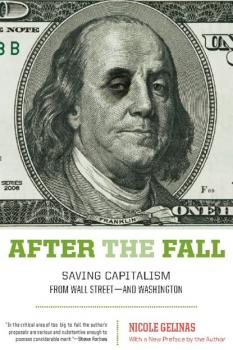ТОП просматриваемых книг сайта:















Зарубежная деловая литература
Различные книги в жанре Зарубежная деловая литература, доступные для чтения и скачиванияАннотация
Аннотация
Аннотация
Аннотация
What exactly is capitalism, and why do its advocates support it? What are the main objections to capitalism that have been raised by its critics? Are there moral reasons to support capitalism, or to oppose it? In this time of globalization and economic turbulence, these questions could not be more timely or more important.This book provides some answers through seminal readings on the nature, purpose, and effects of capitalism as understood by its most influential expositors, both historical and contemporary. In addition to Adam Smith himself, the selections gathered here include essays and excerpts by thinkers ranging from Locke and Rousseau to Hayek and Cass Sunstein. All are chosen and arranged to highlight the ways that capitalism bears on a set of fundamental human concerns: liberty, equality, social order, virtue and motivation.If you want to develop an informed judgment about whether markets and morality mix, this anthology is a good place to begin.
Аннотация
Government-workers unions have been political juggernauts in the U.S. since the unseen collective-bargaining-rights revolution of the 1960s and ’70s. These unions are different and more powerful than those that battle owners and managers in the private sector. To advance their interests, unions in the public sector have created cartels with their political allies, mostly in the Democratic Party, to the exclusion of the taxpaying public.In this Broadside, Daniel DiSalvo shows us how this government takeover happened and tells us what can be done to protect the public interest. The fiscal consequences have already proven dire and threaten the long-term power and prestige of the United States on the world stage.
Информация о книге
Автор произведения Daniel DiSalvo
Жанр Зарубежная деловая литература
Серия Encounter Broadsides
Аннотация
Robust financial markets support capitalism, they don't imperil it. But in 2008, Washington policymakers were compelled to replace private risk-takers in the financial system with government capital so that money and credit flows wouldn't stop, precipitating a depression.Washington's actions weren't the start of government distortions in the financial industry, Nicole Gelinas writes, but the natural result of 25 years' worth of such distortions.In the early eighties, modern finance began to escape reasonable regulations, including the most important regulation of all, that of the marketplace. The government gradually adopted a «too big to fail» policy for the largest or most complex financial companies, saving lenders to failing firms from losses. As a result, these companies became impervious to the vital market discipline that the threat of loss provides.Adding to the problem, Wall Street created financial instruments that escaped other reasonable limits, including gentle constraints on speculative borrowing and requirements for the disclosure of important facts.The financial industry eventually posed an untenable risk to the economy – a risk that culminated in the trillions of dollars' worth of government bailouts and guarantees that Washington scrambled starting in late 2008.Even as banks and markets seem to heal, lenders to financial companies continue to understand that the government would protect them in the future if necessary. This implicit guarantee harms economic growth, because it forces good companies to compete against bad.History and recent events make clear what Washington must do.First, policymakers must reintroduce market discipline to the financial world. They can do so by re-creating a credible, consistent way in which big financial companies can fail, with lenders taking their warranted losses. Second, policymakers can reapply prudent financial regulations so that markets, and the economy, can better withstand inevitable excesses of optimism and pessimism. Sensible regulations have worked well in the past and can work well again.As Gelinas explains in this richly detailed book, adequate regulation of financial firms and markets is a prerequisite for free-market capitalism – not a barrier to it.
Аннотация
New medicines in the pipeline can extend lives, save money, and even help prevent disease before symptoms appear – if we don’t discourage their innovators and investors by trying to lower drug prices artificially. Unlocking Precision Medicine explores the environment necessary for creation of these health care game-changers, and explains how the marketplace can effectively make them more affordable to all without killing the golden goose.  
Информация о книге
Автор произведения Peter Huber J.
Жанр Зарубежная деловая литература
Серия Encounter Intelligence
Аннотация
Shadow of Liberation explores the intricate twists, turns, contestations and compromises of ANC economic and social policymaking with a focus on the transition era of the 1990’s and the early years of democracy. [b][/b]With the damning revelations by the Zondo Commission of Inquiry into State Capture on the massive corruption of the South African body politic, the timing of this book could not be more relevant. South Africans need to confront the economic and social policy choices that the liberation movement made and to see how these decisions may have facilitated the conditions for corruption to emerge and flourish. Answers are needed. Padayachee and van Niekerk focus their attention on the primary question of how and why the ANC, given its historical anti-inequality, re-distributive stance, come in the 1990s, to such a dramatic turn around and move towards an essentially market-dominated approach. Were they pushed or did they go willingly? What role if any did Western governments and international financial institutions play? And what of the role of the late apartheid state and South African business? Did leaders and comrades ‘sell out’ the ANC’s emancipatory policy vision? Shadow of Liberation tries to provide answers to these questions drawing on the best available primary archival evidence as well as extensive interviews with key protagonists across the political, non-government and business spectrum. The authors argue that the ANC’s emancipatory policy agenda was broadly to establish a social democratic welfare state upholding rights of social citizenship. However its economic policy framework to realise this emancipatory mission was either non-existent or egregiously misguided.
Аннотация
In The Corona Crash , leading economics commentator Grace Blakeley theorises about the epoch-making changes that the coronavirus brings in its wake. We are living through a unique moment in history. The pandemic has caused the deepest global recession since the Second World War. Meanwhile the human cost is reflected in a still-rising death toll, as many states find themselves unable – and some unwilling – to grapple with the effects of the virus. Whatever happens, we can never go back to business as usual. This crisis will tip us into a new era of monopoly capitalism, argues Blakeley, as the corporate economy collapses into the arms of the state, and the tech giants grow to unprecedented proportions.










